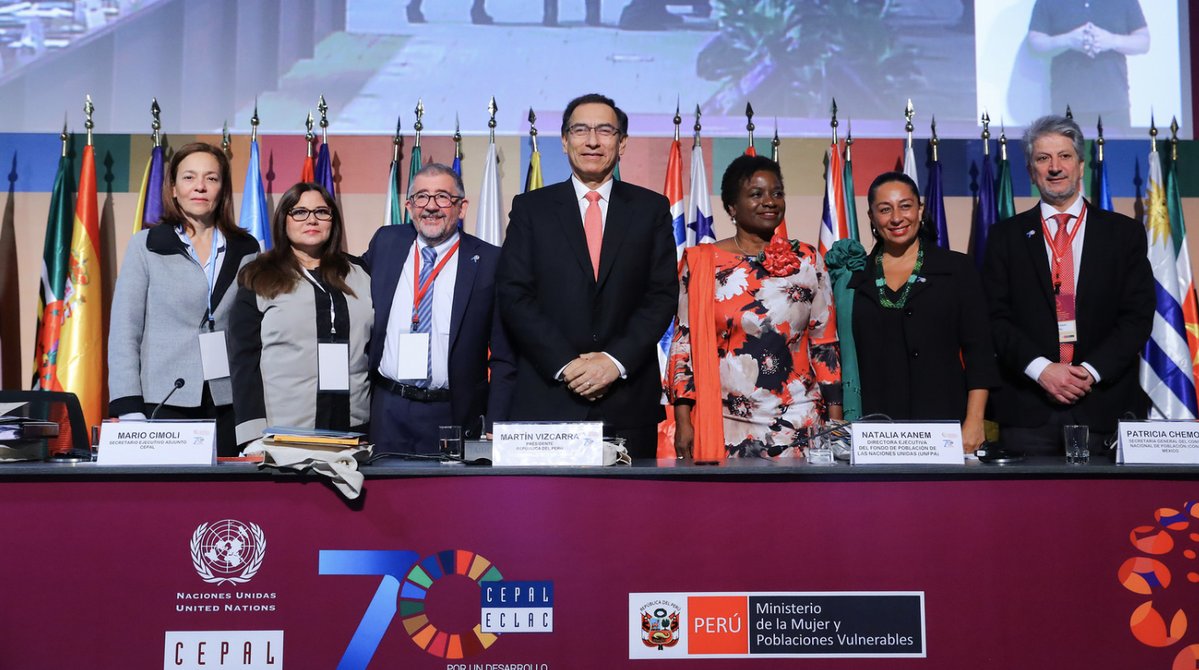
7-9 Aug 2018 Lima, Peru | Conferences and meetings of subsidiary bodies

The third session of the Regional Conference on Population and Development in Latin America and the Caribbean was inaugurated today in Lima, Peru, with a renewed commitment by countries to implement the Montevideo Consensus as well as with a call to intensify the fight against inequality and the eradication of poverty.
This session of the Conference was inaugurated by Martín Vizcarra, President of the Republic of Peru; Mario Cimoli, Deputy Executive Secretary of the Economic Commission for Latin America and the Caribbean (ECLAC); Natalia Kanem, Executive Director of the United Nations Population Fund (UNFPA); and Patricia Chemor, Secretary-General of Mexico’s National Council for Population (CONAPO).
In his opening remarks, President Martín Vizcarra renewed his country’s commitment to the implementation of the Montevideo Consensus on Population and Development, which is the most important intergovernmental agreement on these matters that has been signed to date.
He affirmed that “while there are significant advances on different aspects of human development, we must also overcome great challenges to include all citizens in the benefits of development, especially the poorest and most excluded members of our society.”
The President added that the third session of the Regional Conference on Population and Development “is taking place at a time when the countries of Latin America and the Caribbean make significant efforts to eradicate poverty, exclusion and inequality,” noting that “in Peru, the goals that guide our government are clear: achieving the well-being of the population and thereby having a country that is more just and equitable.”
Mario Cimoli, ECLAC’s Deputy Executive Secretary, emphasized that the Montevideo Consensus synthesizes regional commitments that, when complied with, will help the region’s countries “to leave no one behind.”
He added that a preliminary overview of the five years of implementation of the Consensus indicates that the region has advanced on the comprehension of and the approach to many of the issues on the population and development agenda.
However, he said, “the promise of leaving no one behind requires a greater commitment by our region to the 2030 Agenda for Sustainable Development and to the agendas that help give visibility to groups in conditions of vulnerability, as the Montevideo Consensus does.”
The official from ECLAC highlighted the contribution of the Regional Conference on Population and Development to the Forum of the Countries of Latin America and the Caribbean on Sustainable Development, since it is the only intergovernmental body that is charged with studying and analyzing the demographic trends that constitute the framework for compliance with the 2030 Agenda in the region.
In her remarks, Natalia Kanem indicated that, in light of global challenges such as inequality, human rights violations, migration and displacement, and climate change, “the Montevideo Consensus is a bright and powerful ray of hope.”
“When the 2030 Agenda calls on us to leave no one behind and reach the neediest person first, the Montevideo Consensus provides us with a road map,” she stated.
Patricia Chemor, meanwhile, sustained that Latin America and the Caribbean faces great challenges that countries must tackle with information, strategies and mechanisms that are up to the task of meeting the demands of the people inhabiting our region.
“There are still major inequalities in economic, social and gender-related matters, in access to health services, education, a full life and to the expansion of opportunities, which we must address to have a present and a future that is more just and decent for all. And one of the mechanisms for achieving this is precisely the Montevideo Consensus,” she said.
Participants in the third session of the Regional Conference on Population and Development include ministers, deputy ministers and delegates from Latin American and Caribbean countries, along with representatives of international organizations, the private sector, academia and civil society.
During the gathering – organized by ECLAC and the government of Peru, with the support of UNFPA – the countries of the region will present voluntary reports regarding national progress on implementation of the Montevideo Consensus.
In this framework, ECLAC presented today the draft of the first regional report on the implementation of the Montevideo Consensus on Population and Development, which assesses the progress made on this implementation and the heterogeneities that exist among countries in that process.
The Conference will conclude on Thursday, August 9, with the presence of César Villanueva, President of the Council of Ministers of Peru.